"Cherishing Little Steps - A Haven for Baby and Family Journeys"
The Best Skincare Products for Acne-Prone Skin#COMMA
When it comes to managing acne-prone skin, choosing the right skincare products can make all the difference in achieving clearer, healthier skin. From salicylic acid toners to niacinamide creams, each product plays a crucial role in addressing acne concerns. But what if there was a game-changer you haven't considered yet? Stay tuned to discover a lesser-known skincare gem that could revolutionize your acne-fighting routine.
Key Takeaways
- Salicylic Acid Toners for deep pore exfoliation and acne prevention.
- Benzoyl Peroxide Treatments to target and reduce acne-causing bacteria.
- Tea Tree Oil Serums with antimicrobial properties to fight acne.
- Niacinamide Creams for sebum regulation and anti-inflammatory benefits.
Gentle Cleansers
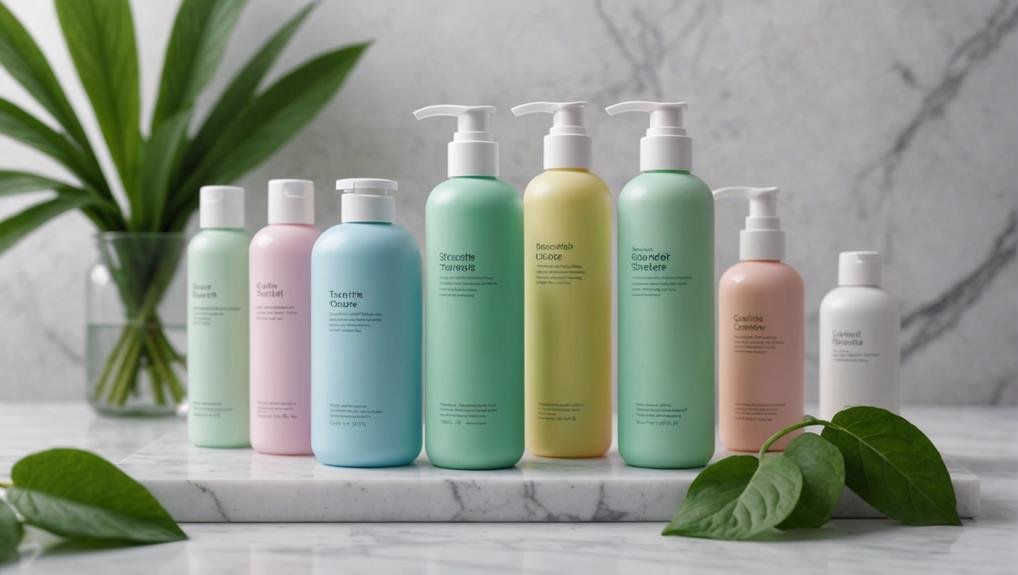
When choosing gentle cleansers for acne-prone skin, opt for products that are non-comedogenic and formulated specifically to minimize irritation and breakouts. These cleansers help maintain the skin barrier, crucial for protecting against external aggressors while ensuring hydration balance.
It's essential to select products with balanced pH levels to support the skin's natural protective barrier and prevent over-drying, which can trigger increased oil production.
Gentle cleansers also offer exfoliation benefits, aiding in the removal of dead skin cells that can clog pores and contribute to acne. Look for ingredients like salicylic acid or glycolic acid in low concentrations to gently exfoliate without causing irritation.
Excessive exfoliation can disrupt the skin's natural balance, so it's crucial to find a cleanser that provides mild exfoliation suitable for acne-prone skin.
Salicylic Acid Toners
For further enhancing your skincare routine for acne-prone skin, consider incorporating salicylic acid toners. Salicylic acid is a beta hydroxy acid that exfoliates the skin, unclogs pores, and reduces inflammation, making it a potent ingredient for combating acne.
When choosing a salicylic acid toner, opt for alcohol-free formulas to prevent excessive drying of the skin. There are different types of salicylic acid toners available, including ones with varying concentrations to suit different skin sensitivities.
One benefit of salicylic acid toners is their ability to penetrate deep into the pores, dissolving oil and dead skin cells that can lead to breakouts.
If you prefer a more natural approach, you can explore DIY toner recipes using ingredients like witch hazel, green tea, or apple cider vinegar, which also offer antibacterial and anti-inflammatory properties. These alternative skincare ingredients can complement the effects of salicylic acid, providing a holistic approach to acne-prone skin care.
Benzoyl Peroxide Treatments
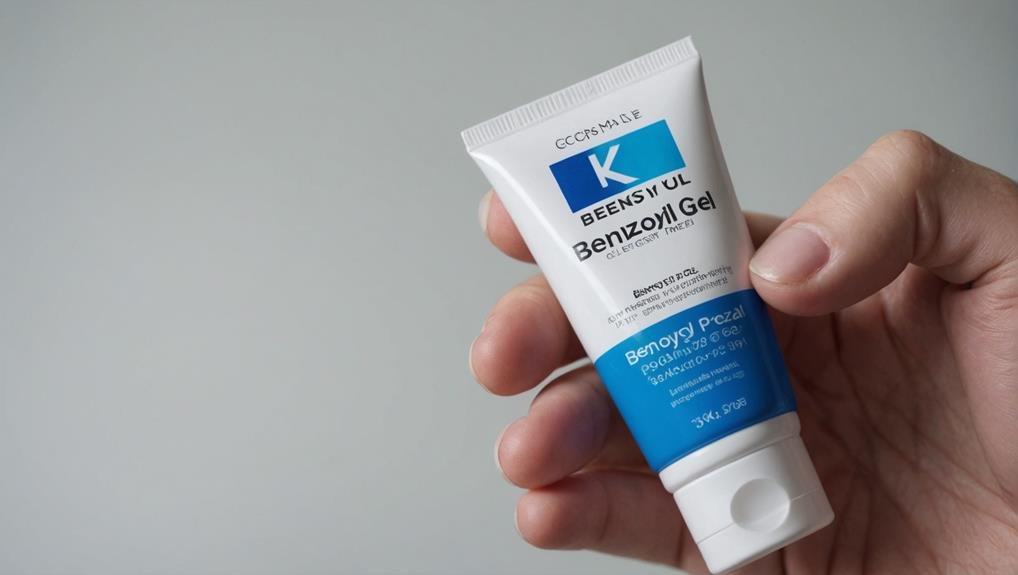
Consider incorporating benzoyl peroxide treatments into your skincare regimen to effectively target acne-prone skin. Benzoyl peroxide is a potent ingredient known for its ability to kill acne-causing bacteria, reduce inflammation, and unclog pores.
However, like any active ingredient, there are potential side effects to be aware of, such as dryness, redness, and peeling. It's essential to start with a lower concentration, around 2.5% to 5%, to minimize irritation while still being effective. Gradually increase the concentration if needed, but be cautious as higher concentrations can lead to more significant side effects.
When applying benzoyl peroxide, start by cleansing your face thoroughly to remove any impurities. Then, apply a pea-sized amount of the product gently onto the affected areas, avoiding the delicate skin around your eyes and mouth.
It's advisable to use benzoyl peroxide as part of your nighttime routine, as it can make your skin sensitive to sunlight. If you experience excessive dryness or irritation, consider alternative treatments like salicylic acid or sulfur-based products to address your acne concerns effectively.
Tea Tree Oil Serums
Incorporating Tea Tree Oil Serums into your skincare routine can be beneficial for managing acne-prone skin. Known for its antimicrobial properties, tea tree oil can help combat acne-causing bacteria and reduce inflammation, making it a valuable addition to your skincare arsenal.
When using tea tree oil serums, it's important to consider your skin sensitivities, as some individuals may experience irritation or allergic reactions.
For those looking for natural alternatives in their skincare routines, tea tree oil serums offer a plant-based solution that can complement your existing regimen. Many commercial products contain tea tree oil, but for those interested in DIY remedies, creating your own serum at home is also an option. By mixing tea tree oil with carrier oils like jojoba or coconut oil, you can tailor the concentration to suit your skin's needs.
Whether used as a spot treatment or incorporated into your daily routine, tea tree oil serums provide a gentle yet effective way to address acne-prone skin without harsh chemicals.
Clay Masks

Utilize the benefits of clay masks to help manage acne-prone skin by harnessing their absorbent and purifying properties. Clay masks are a great addition to your skincare routine as they can help draw out impurities, excess oil, and unclog pores, leading to clearer skin. When applying a clay mask, ensure your face is clean and dry before gently spreading a thin layer evenly. Allow the mask to dry for about 10-15 minutes, then rinse off with warm water.
| Application Techniques | Benefits |
|---|---|
| Apply a thin, even layer on clean, dry skin | Draws out impurities |
| Leave on for 10-15 minutes before rinsing off | Helps absorb excess oil |
| Use 1-2 times a week | Unclogs pores for clearer skin |
For optimal results, incorporate clay masks into your skincare routine 1-2 times a week. Consistent use can lead to a reduction in acne breakouts, minimized pores, and a brighter complexion. Remember to follow up with a moisturizer suitable for acne-prone skin after using a clay mask to maintain skin hydration.
Oil-Free Moisturizers
Enhance your skincare routine for acne-prone skin by selecting oil-free moisturizers designed to provide hydration without clogging pores. Hydrating serums can be a great addition to your regimen, as they offer lightweight moisture that won't overwhelm your skin. Look for ingredients like hyaluronic acid or glycerin to help maintain your skin's hydration levels without adding extra oil.
When choosing oil-free moisturizers, consider products that also contain acne-fighting exfoliants like salicylic acid or benzoyl peroxide. These ingredients can help unclog pores, reduce inflammation, and prevent breakouts while keeping your skin moisturized. Remember to patch test new products, especially if you have sensitive skin, to avoid potential irritations.
Finding the right oil-free moisturizer can be a game-changer for acne-prone skin. It can provide the necessary hydration your skin needs without worsening existing breakouts. Remember to cleanse your skin thoroughly before applying any moisturizer to ensure maximum effectiveness.
Retinol Serums
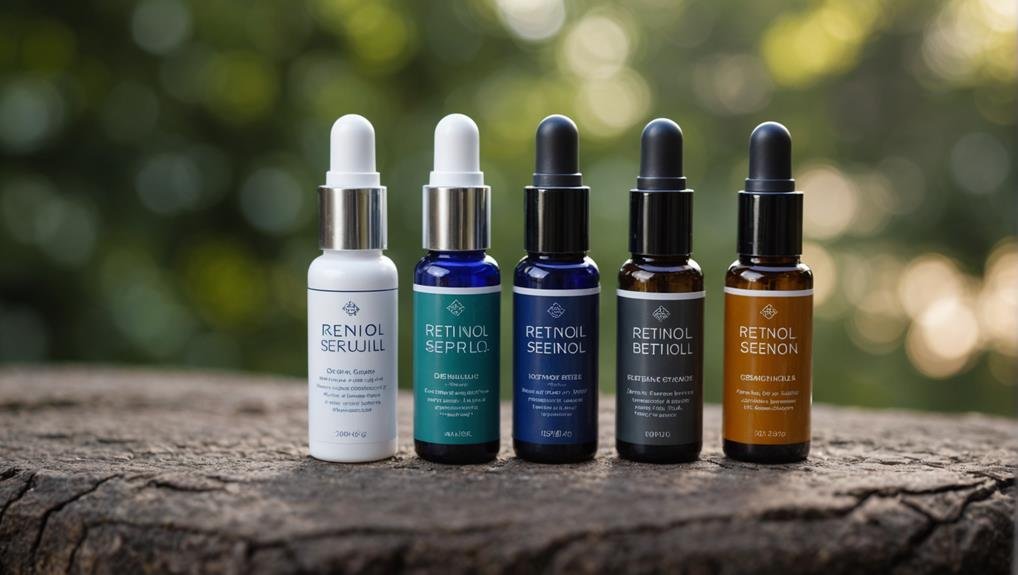
Consider incorporating retinol serums into your skincare routine to target acne-prone skin and improve overall skin texture. Retinol, a form of vitamin A, offers multiple benefits for acne-prone skin. It helps unclog pores, reduce inflammation, and promote skin cell turnover, which can aid in preventing breakouts and reducing acne scars.
When using retinol serums, start by applying a pea-sized amount to clean, dry skin in the evening. Remember to wear sunscreen during the day as retinol can increase skin sensitivity to the sun.
For those with sensitive skin, choosing the right retinol serum is crucial. Look for serums that contain lower concentrations of retinol to minimize irritation. Additionally, opt for products with added soothing ingredients like hyaluronic acid or niacinamide to help counteract potential dryness or redness. Some recommended retinol serums for sensitive skin include La Roche-Posay Retinol B3 Serum, The Ordinary Granactive Retinoid 2% Emulsion, and CeraVe Skin Renewing Retinol Serum.
When starting with retinol, it's advisable to begin with a lower concentration and gradually increase frequency as your skin builds tolerance.
Spot Treatments
To effectively target specific blemishes and accelerate their healing process, incorporating spot treatments into your skincare routine can be beneficial for managing acne-prone skin. Spot treatments are designed to address individual breakouts, reducing inflammation and promoting faster healing.
When looking for spot treatments, consider natural remedies like tea tree oil, known for its antimicrobial properties that can help combat acne-causing bacteria. Additionally, lifestyle changes can play a significant role in managing acne. Ensuring you maintain a balanced diet, stay hydrated, and manage stress levels can all contribute to healthier skin and fewer breakouts.
While spot treatments can be effective, it's essential to remember that consistency is key. Apply the treatment directly onto the blemish and follow the product instructions for best results. By incorporating spot treatments alongside natural remedies and lifestyle changes, you can effectively combat acne and promote clearer, healthier skin.
Sulfur Masks
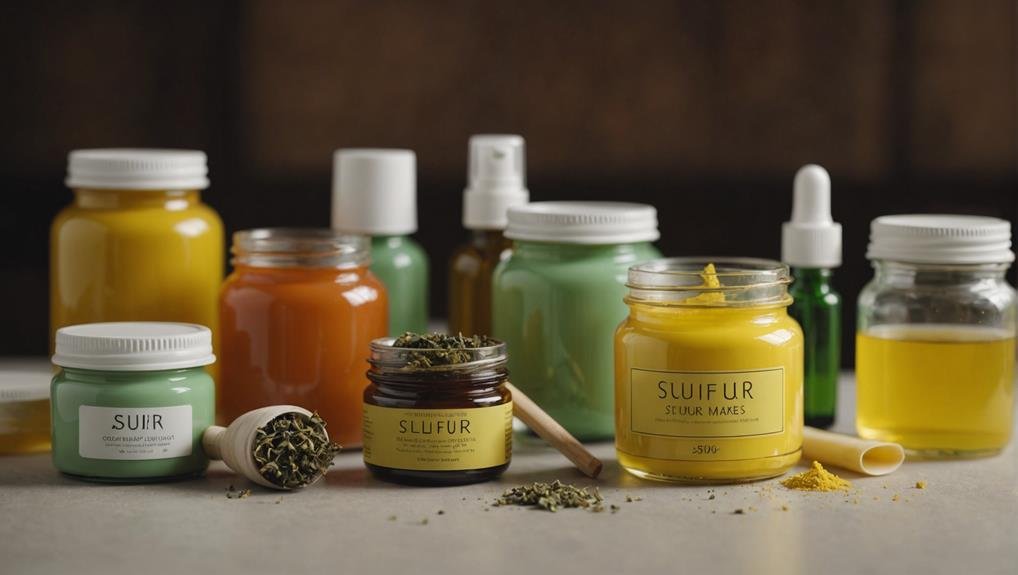
When targeting acne-prone skin, incorporating sulfur masks into your skincare routine can be an effective strategy. Sulfur mask benefits include reducing excess oil production, unclogging pores, and fighting acne-causing bacteria.
To apply a sulfur mask effectively, start by cleansing your face, then apply a thin layer of the mask, avoiding sensitive areas like the eyes. Leave it on for the recommended time and rinse off gently with lukewarm water.
Benefits of Sulfur Masks:
- Reduces excess oil production
- Unclogs pores
Sulfur masks can be highly effective for acne-prone skin, but if you're looking for alternatives, consider products with ingredients like salicylic acid or benzoyl peroxide. These alternatives can also help in reducing inflammation and preventing breakouts. Remember to patch-test any new product to ensure it suits your skin type.
When used consistently and as part of a balanced skincare routine, sulfur masks or their alternatives can make a significant difference in managing acne.
Hyaluronic Acid Serums
Incorporating a hyaluronic acid serum into your skincare routine can provide essential hydration and promote skin plumpness for individuals with acne-prone skin. Hyaluronic acid is a powerful humectant that attracts and retains moisture, helping to keep the skin hydrated without clogging pores or exacerbating acne. The benefits of using a hyaluronic acid serum include improved skin hydration, reduced appearance of fine lines and wrinkles, and enhanced overall skin texture.
When applying a hyaluronic acid serum, it's essential to start with a clean, toned face to allow for better absorption. Gently pat the serum onto your skin and follow up with a moisturizer to seal in the hydration. It's recommended to use hyaluronic acid serums in the morning and evening for optimal results.
When selecting a hyaluronic acid serum, look for products that contain pure hyaluronic acid or sodium hyaluronate, as these are the most effective ingredients. Additionally, be cautious when combining hyaluronic acid serums with products containing vitamin C, as the combination may cause interactions that reduce the efficacy of both ingredients.
Niacinamide Creams
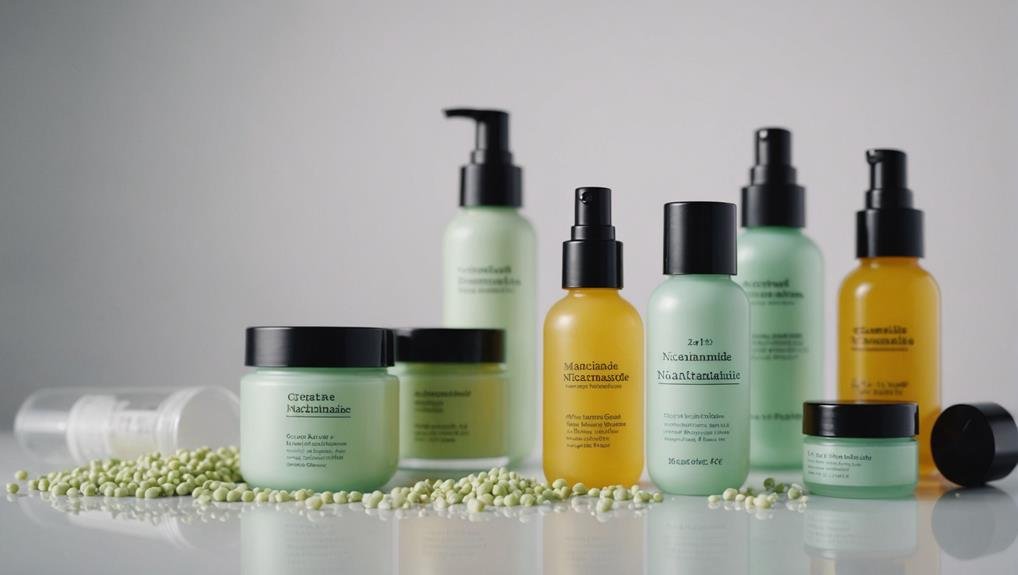
For individuals with acne-prone skin seeking additional skincare options, exploring the benefits of incorporating niacinamide creams into your routine can provide a valuable solution. Niacinamide, also known as vitamin B3, offers a range of benefits for acne-prone skin, making it a popular choice in skincare products.
Here are some key points to consider:
- Niacinamide Benefits: Niacinamide has anti-inflammatory properties that can help reduce redness and irritation associated with acne. It also helps regulate sebum production, preventing clogged pores and breakouts.
- Application Techniques: When using niacinamide creams, it's essential to start with a patch test to check for any sensitivity. Incorporate it into your routine by applying a pea-sized amount after cleansing and toning, before heavier creams or oils.
SPF 30+ Sunscreens
SPF 30+ sunscreens are essential for protecting acne-prone skin from harmful UV rays and preventing potential skin damage. Sun protection is crucial in managing acne as exposure to UV rays can lead to inflammation and post-inflammatory hyperpigmentation, exacerbating acne symptoms.
When choosing a sunscreen for acne-prone skin, opt for oil-free, non-comedogenic formulas that won't clog pores or trigger breakouts. Look for ingredients like zinc oxide or titanium dioxide, which provide broad-spectrum protection without irritating sensitive skin.
Acne prevention goes hand in hand with sun protection, as UV exposure can worsen acne by increasing oil production and causing skin dehydration. By incorporating a lightweight SPF 30+ sunscreen into your daily skincare routine, you not only shield your skin from harmful rays but also reduce the risk of acne flare-ups.
Remember to apply sunscreen generously and reapply every two hours, especially if you're spending extended periods outdoors. Prioritizing sun protection with the right SPF 30+ sunscreen can help maintain a healthy complexion and prevent further skin damage.
Frequently Asked Questions
Can I Use Acne Patches Along With These Products?
Yes, you can use acne patches with other products. While they are effective in targeting individual spots, consider alternative treatments for broader acne concerns. Combining patches with a comprehensive skincare routine can enhance results.
Are These Products Safe to Use During Pregnancy?
Hey there! When expecting, it's crucial to be cautious about skincare ingredients. Some commonly used acne treatment components might not be safe during pregnancy due to hormonal changes. Always consult with your healthcare provider for guidance.
How Long Should I Wait Between Applying Products?
To maximize effectiveness, wait at least 5 minutes between applying skincare products. Proper waiting times allow each product to be absorbed fully, leading to better results. Layering products too quickly can reduce their efficacy.
Can I Use These Products on Sensitive Skin?
Yes, you can use these skincare products on sensitive skin, but it's crucial to be cautious. Some common irritants in skincare routines might trigger reactions in sensitive skin. Patch testing new products can help avoid potential issues.
Should I Avoid Certain Foods While Using These Products?
While using skincare products, dietary restrictions can benefit your skin health. Avoiding food allergies and triggers can complement product effectiveness. Stay mindful of your diet to support your skin in achieving its best condition.
Conclusion
Now that you have discovered the best skincare products for acne-prone skin, it's time to put them to the test and see the results for yourself.
By incorporating these products into your skincare routine, you can effectively manage acne, reduce excess oil production, and maintain healthy, clear skin.
Remember to follow the recommended usage guidelines and make sure to consult with a dermatologist if needed.
Take control of your skin health and embrace the benefits of these powerful products.

